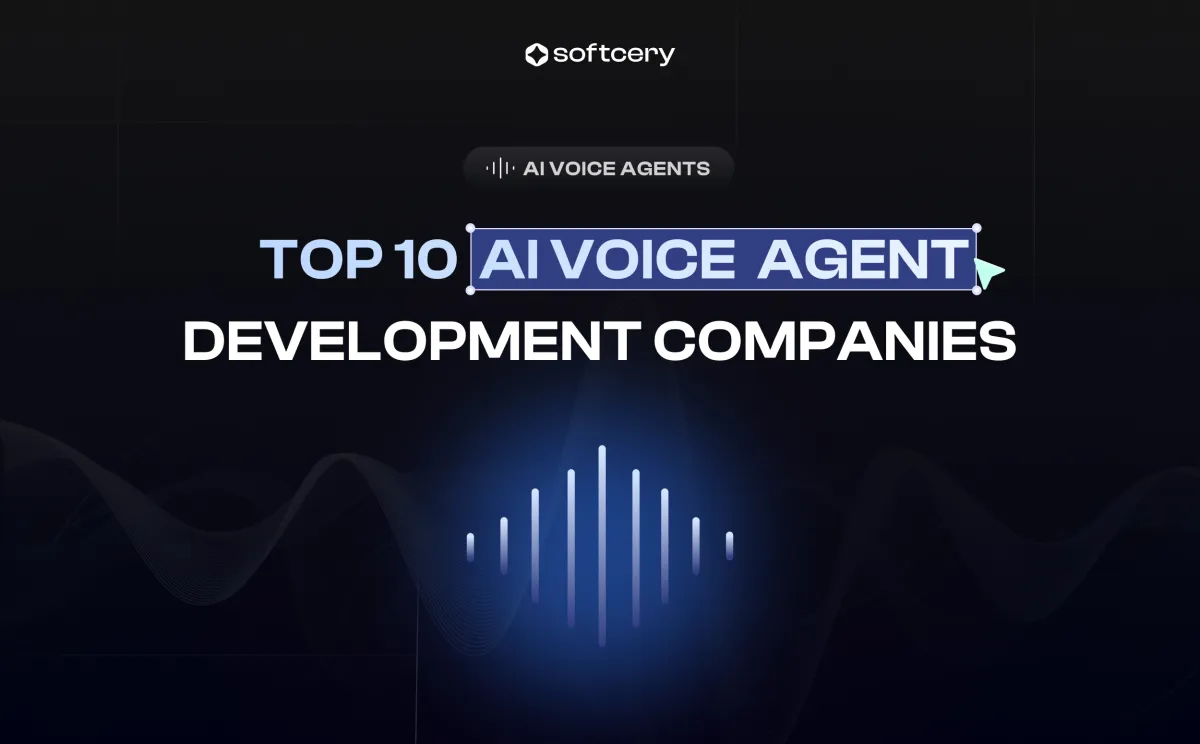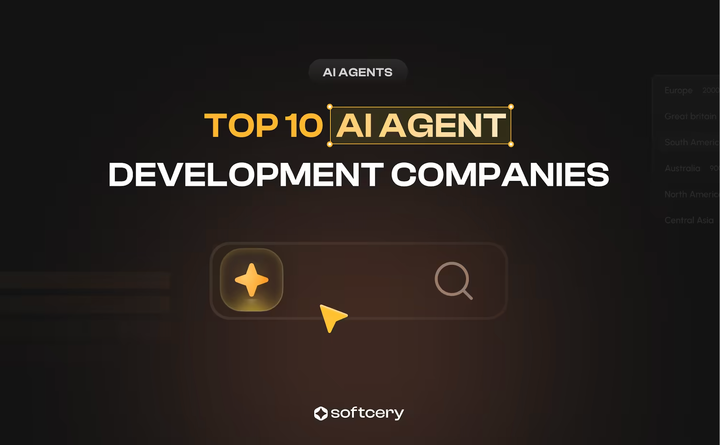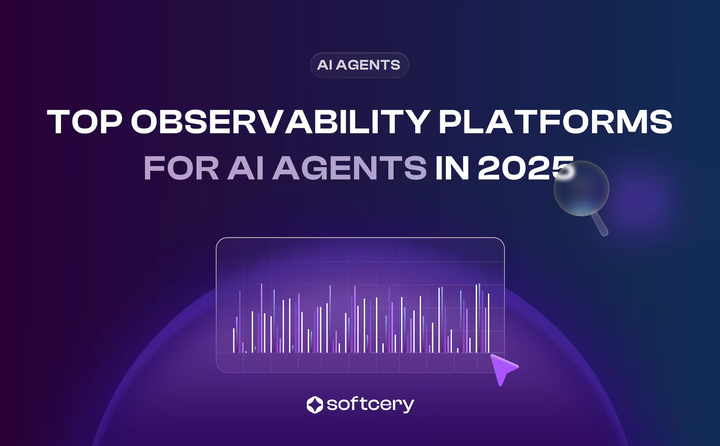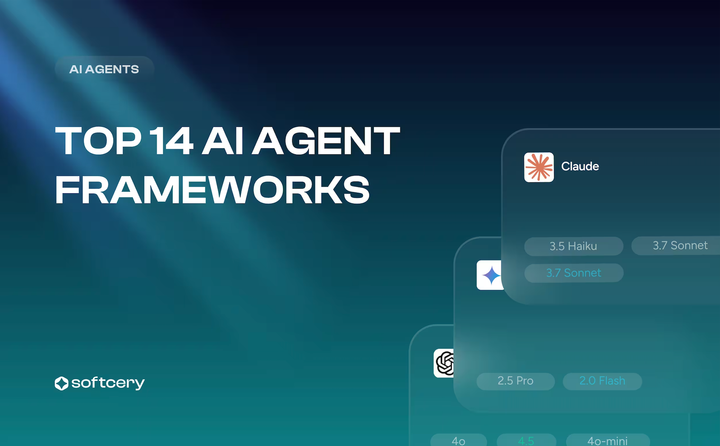
Top 10 AI Voice Agent Development Companies
A detailed comparison of AI voice agent companies, their capabilities, and how to evaluate vendors for latency, scalability, and integration needs.
When you’re developing voice agents, there are always two sides to think about. First, the benefits you’ll get from a well-built AI voice agent: faster resolution times, improved customer satisfaction, more personalised interactions, and increased upsell opportunities.
The second side is the risks of AI voice agent failures you might face: conversation design limitations and NLU gaps, integration challenges, production traffic, security vulnerabilities, and data lifecycle management.
We know the first question that pops into your head is, “How do I deal with all these challenges and build a production-ready AI voice agent?” The answer is simple: find a reliable company that will guide you through the entire process.
Softcery is here to introduce 10 of the best AI voice agent development companies to help you on your way.
What Makes Voice Agent Development Different
You might think building a voice agent is the same as making a chatbot but it’s not. Voice agents have their own rules, tools, and challenges. Here’s why voice agent development is a separate field:
Real-time constraints: Voice agents must respond extremely quickly, typically within sub-500 ms. Delays that would be fine in text chat become very noticeable in voice. Achieving this requires fast streaming architectures, optimised model inference, and smooth coordination between speech-to-text, reasoning, and text-to-speech components.
Conversation naturalness: Voice reveals awkward phrasing that reads fine in text. Turn-taking, interruptions, filler words, and natural speech patterns require different conversation design than text interfaces.
Speech recognition complexity: Voice brings problems that text doesn’t: accents, background noise, overlapping speakers, or unclear pronunciation. Production systems need strong transcription and smart error handling to handle these issues gracefully.
Telephony integration: Voice agents connect to phone systems, IVR infrastructure, and call routing logic. This telephony layer adds complexity that text chatbots avoid.
Higher stakes: Failed voice interactions feel more frustrating than failed text chats. Users can't easily scan conversation history or correct misunderstandings. Voice agents need higher reliability.
The Best AI Voice Agent Development Companies
Different types of providers bring different strengths and approaches. Knowing the main categories can help you choose the right partner for your project.
Companies that build voice agents usually fall into three groups:
- Specialised developers: Focus only on voice agents and have deep expertise.
- Full-service consultancies: Offer voice agents as part of broader AI services.
- Enterprise platforms: Provide voice capabilities along with implementation support.
Softcery
Specialised Voice Agent Development for B2B SaaS
- Founded: 2017
- Headquarters: California, USA
- Focus: Production-ready voice agent development for B2B SaaS in marketing automation, legal tech, and e-commerce.
Voice agent specialisation:
Softcery builds voice agents specifically, not conversational AI broadly.
The team understands voice-specific challenges:
- Achieving consistent sub-500 ms latency under production telephony conditions.
- Designing conversation flows that sound natural when spoken, not just written.
- Handling speech recognition errors and conversation repair gracefully.
- Integrating with telephony infrastructure (SIP trunking, IVR systems, call routing).
- Building fallback logic for when voice agents need human escalation.
Technical approach: Softcery builds voice agents with separate modules for speech-to-text, reasoning, business logic, and text-to-speech, so each part can be optimised and scaled independently. Use voice-specific pipelines and workflows that minimise latency, handle multi-step reasoning, access external knowledge when needed, and include real-time monitoring for performance, quality, and costs.
Best fit for:
- B2B SaaS founders where voice interaction is strategically important.
- MVP-stage founders who built basic voice prototypes with simple API calls but need production-ready systems.
- Post-MVP founders (3–10 customers) whose voice agents buckle under real usage.
- Founders who attempted platform solutions but hit limits around conversation design, integration depth, compliance requirements, or cost at scale.
- Organisations requiring sophisticated domain logic in voice conversations.
Synthflow
Specialised Voice Agent Developer
- Founded: 2025
- Headquarters: USA
- Focus: AI voice agent development with a complete AI voice operating system
Synthflow offers a platform that enables businesses to deploy human-like AI voice agents rapidly, with low latency and multilingual support.
Voice agent approach: Their solution is designed for enterprises seeking to automate phone conversations at scale, providing a unified tool for building, launching, and managing voice AI agents.
Best fit for: Enterprises aiming for fast deployment of AI voice agents without extensive engineering resources.
Prismetric
Full-service Consultancy
- Founded: 2010
- Headquarters: India
- Focus: End-to-end AI voice agent development services
Prismetric offers comprehensive services including AI voice strategy, custom development, voice user interface (VUI) design, NLP model training, and system integration.
Voice agent approach: They specialise in creating industry-specific AI voice agents for sectors like healthcare, finance, and e-commerce.
Best fit for: Organisations seeking a full-service partner to develop and integrate AI voice agents tailored to their industry needs.
Impekable
Full-service Consultancy
- Founded: 2012
- Headquarters: USA
- Focus: AI voice agent development with a design-first approach
Impekable combines enterprise-level engineering with design expertise to deliver digital products, including AI voice agents, for clients ranging from startups to Fortune 500 companies. They focus on creating intuitive and effective voice interfaces that align with brand identity.
Best fit for: Businesses looking for a design-centric approach to developing AI voice agents that provide seamless user experiences
Biz4Group
Full-Service AI Consultancy
- Founded: 2011
- Headquarters: Global (US, India, UAE)
- Focus: End-to-end AI development services including voice agents
Biz4Group operates as a traditional software consultancy expanded into AI development. They provide voice agent development as part of broader AI services.
Voice agent approach: Biz4Group builds voice agents using Python and machine learning frameworks (TensorFlow, PyTorch). They offer end-to-end services from consultation through deployment for various AI agent types including voice. As a general consultancy rather than voice specialists, they handle voice agents alongside chatbots, employee training AI, and automation projects across industries (healthcare, fintech, e-learning, logistics).
Best fit for: Organisations needing full-service development support across the entire project lifecycle. Works for companies without internal AI expertise requiring a partner to handle everything from requirements through maintenance. Traditional consultancy model with established processes and global delivery capabilities, offering flexibility in team size and engagement length.
Regal AI
Platform + Managed Service for Customer Engagement
- Founded: 2020
- Headquarters: New York, NY
- Focus: Voice AI platform with managed services for customer engagement
Regal AI provides a voice agent platform combined with managed services. They position between DIY platforms and full custom development.
Voice agent approach: Multi-channel voice agents for customer support, lead qualification, scheduling, collections, and bookings. The platform supports 30+ languages with hundreds of accents and follows a "build once, deploy everywhere" model across voice, messaging, and digital channels.
Best fit for:
- Mid-to-large enterprises that want faster deployment than custom development but more support than self-service platforms.
- Organisations with standard customer engagement use cases benefiting from Regal's pre-built patterns.
- Consumer enterprises across healthcare, insurance, education, home services, and financial services seeking to automate interactions while maintaining quality.
Kore.ai
Enterprise Platform with Voice Capabilities
- Founded: 2014
- Headquarters: Orlando, FL
- Focus: Enterprise conversational AI platform including voice
Kore.ai provides an enterprise conversational AI platform supporting voice, chat, and digital channels with both no-code and pro-code development tools.
Voice agent approach: Multi-agent orchestration enabling voice agents to collaborate and share memory. Supports both no-code (business users) and pro-code (developers) development. Voice capabilities integrated with a broader conversational AI platform.
The platform includes Prompt Studio, Evaluation Studio, and agentic RAG for knowledge-intensive voice applications. It offers 100+ pre-built connectors and integrates with Microsoft Azure, AWS, and major enterprise platforms.
Best fit for:
- Large enterprises requiring conversational AI across multiple channels (with voice as one component) under strict security, compliance, and governance requirements.
- Organisations needing both citizen developer and professional developer capabilities.
Uniphore
Enterprise AI Cloud Platform
- Founded: 2008
- Headquarters: Palo Alto, CA
- Focus: Enterprise AI platform for multi-functional agent deployment
Uniphore provides a comprehensive business AI Cloud enabling enterprises to deploy AI agents across customer service, marketing, sales, HR. Voice agents are one component of a broader platform.
Voice agent approach: Voice agents are deployed as part of a multi-functional AI strategy rather than a voice-specific focus. The platform supports agents for customer service, sales, marketing, and HR recruiting under unified governance.
Best fit for:
- Large enterprises implementing AI agents across multiple business functions with complex security, compliance, and data governance requirements.
- Organisations requiring on-premises or multi-cloud deployment to meet data residency and regulatory needs.
Yellow.ai
Agentic AI for Enterprise Automation
- Founded: 2016
- Headquarters: San Mateo, CA
- Focus: Enterprise agentic AI agents for customer and employee experience
Yellow.ai provides an agentic AI platform enabling voice agents that pursue defined business goals autonomously. Emphasis on emotional intelligence and goal-oriented behavior.
Voice agent approach: Agentic voice agents that pursue goals (resolve billing, complete booking, handle cancellation) within defined guardrails, adapting in real time. Real-time emotional detection through vocal biomarkers (pitch, tone, speech pace) enables routing of distressed customers and tone adjustment.
Omnichannel capabilities span 35+ channels and 135+ languages, supported by a no-code/low-code builder, 150+ enterprise integrations, and orchestration across 15+ LLM models.
Best fit for:
- Large enterprises prioritising automation rates and cost reduction across high-volume customer interactions.
- Organisations needing voice agents capable of handling complex, multi-step processes autonomously.
- Agentic environments where voice agents actively pursue goals rather than respond passively.
OneReach.ai
No-Code AI Agent Orchestration
- Founded: 2016
- Headquarters: Denver, CO
- Focus: No-code platform for orchestrating multimodal AI agents
OneReach.ai provides a no-code platform for creating AI agents including voice capabilities. Focus on accessibility for non-technical users.
Platform approach: No-code development enabling organisations to create voice agents without extensive technical expertise. Multimodal AI agent creation where voice is one modality among several. The platform is designed for flexible, customisable AI agent development accessible to business users beyond technical teams.
Best fit for:
- Organisations wanting to create voice agents without coding or extensive technical implementation.
- Business users who need to deploy agents quickly using visual tools.
- Companies seeking multimodal agents (voice + other channels) within a unified no-code development environment.
Evaluation of Your AI Voice Agent Project Requirements
Now that you have a list of reliable AI voice agent developers, the next step is to evaluate your project to find the right partner.
Before choosing a vendor, consider these key points:
- Use case complexity: Simple tasks like booking appointments can use platform templates. Complex workflows with multi-step logic, system coordination, or dynamic decisions usually need custom development.
- Integration depth: If the agent only reads data from APIs, a platform works. If it needs to write to multiple systems or sync data in real time, custom is better.
- Conversation design: Standard scripts (FAQ, lead qualification, bookings) fit platforms. Complex, domain-specific conversations with advanced error handling need custom design.
- Scale and cost: Platforms are usually cheaper under 10,000 calls/month. For 100,000+ calls/month or very complex workflows, custom development may be more cost-effective.
- Compliance: Basic compliance (HIPAA, SOC2) is covered by most platforms. Specialised rules (financial, government, data residency) often require custom solutions.
- Strategic importance: If voice is a key differentiator for your product, custom is best. If it’s a convenience feature like competitors have, platforms are sufficient.
Build vs Platform Decision Framework
You need to decide how to bring your voice agent to life: build it from scratch or leverage a platform. The right choice depends on your goals, resources, and project complexity.
Voice agent platform is a good option when:
- Use cases fit standard patterns without significant differentiation needed;
- Speed to market more important than conversation quality differentiation;
- Call volumes under 50K monthly where platform economics are competitive;
- Limited internal technical resources for voice agent maintenance;
- Multi-channel requirements where unified platform provides value;
- Risk tolerance low and vendor validation important.
Custom development is the approach for you when:
- Voice interaction strategically important and differentiates product;
- Vertical requirements need domain expertise and custom conversation patterns;
- Platform limitations discovered in integration, customisation, compliance, or cost;
- Call volumes justify investment (50K–100K+ monthly);
- Code ownership desired to avoid vendor lock-in for strategic capability;
- Specific conversation design and user experience critical to business value.
The hybrid path:
Many organisations start with platforms for speed, discover limitations in production, then engage voice agent specialists for custom development. The hybrid approach makes sense when:
- Need to validate voice agent value proposition quickly;
- Willing to accept platform limitations during validation;
- Prepared to invest in custom development once product–market fit proven;
- Understand platform costs and limitations as time-limited rather than permanent solution.
Choosing the Right Voice Agent Development Partner
Before you commit to a voice agent partner, it helps to step back and look at the most important things that affect success. Here are six dimensions to guide you.
Define Requirements and Success Criteria
Be specific about use cases: Instead of “customer support,” choose a more specific goal, for example “handle billing questions, subscription changes, and payment updates.”
Set measurable goals:
- Conversation completion rate: aim for 70–85%;
- Escalation rate: aim for 15–30%;
- Average handling time;
- Cost per conversation vs human agents
Clarify data and integration needs:
- What data does the agent need to read or write?
- Which systems need to connect (CRM, billing, scheduling)?
- Do updates need to happen in real time?
Check scale and rules:
- Current and expected call volumes
- Compliance rules (HIPAA, PCI DSS, SOC2, GDPR)
- Timeline and budget limits
Assess Voice Agent Specialisation
Look for agents actually used by customers at scale, not demos. Ask for call volumes, industries, and references.
Check voice-specific skills: Can they keep latency under sub-500 ms? Do conversations sound natural when spoken? Can they handle accents, background noise, and errors?
Experience with telephony: SIP, IVR, and call routing — have they integrated with production phone systems before?
Verify real-world deployment experience: How do they debug problems, monitor performance, and optimise after launch?
Remember: Chatbot experience alone isn’t enough — pick a partner who’s solved real production voice challenges.
Evaluate Vertical Expertise
Check domain knowledge: Do they understand your industry’s terminology, workflows, and regulations?
Look at their portfolio: Ask for examples in your industry. What problems did they solve?
Talk to references in your vertical: Did the partner already know the industry or learn on the job? Did they bring valuable methods from other clients?
Validate Technical Capabilities
Run a small proof of concept (POC): Test your biggest challenges first — latency, accents, integration complexity. POCs usually cost USD 5K–25K for 2–4 weeks but prevent bigger failures later.
Review their architecture: How do STT, LLM reasoning, TTS, and integrations fit together? Can it handle scale, failures, and latency? Is monitoring included?
Meet the team: What experience do the assigned developers have? Are they dedicated to your project or shared across clients?
Assess Business Fit
Evaluate communication: Are they clear, responsive, and willing to explain rather than just sell?
Understand total costs: Consider development, infrastructure (compute, APIs, telephony), maintenance, and future upgrades. Look at the total cost of ownership.
Clarify ownership: Who owns the code, conversation designs, and training data? Platforms often retain ownership; custom builds usually transfer it to you.
Check stability: Are they financially healthy? Do they retain customers? How reliable is support and their roadmap?
Check References Ruthlessly
Don't be afraid to ask tough questions:
Partnership quality: Did they handle issues well? Would you work with them again?
Voice agent performance: Completion rates, escalations, latency in real use.
Process reality: Timeline, budget, communication — what went wrong and right?
Post-launch support: How responsive are they? Any hidden costs?
Even positive references reveal patterns about the vendor’s strengths and weaknesses.
Final Thoughts
Building a voice agent is a mix of opportunity and challenge. On one hand, a well-built AI voice agent can save time, improve customer experience, and personalize interactions. On the other hand, if you underestimate the complexity, you risk frustrating your customers and wasting resources.
The key is knowing what matters for your specific project: the complexity of conversations, integration needs, scale, compliance, and strategic importance. Start by clearly defining your goals, evaluate potential partners for both technical skill and domain expertise, and don’t skip testing with a small proof of concept.
Remember, there’s no one-size-fits-all. Some companies start with platforms to validate value quickly, then move to custom development once they need more control and performance. Others go straight for a fully custom approach if voice is central to their product. Either way, the right partner makes all the difference.
FAQs
- Do I always need a custom-built voice agent?
Not necessarily. Platforms work well for standard use cases with moderate call volumes and basic integrations. Custom development makes sense when voice is a strategic differentiator, conversations are complex, or compliance and scale are critical.
- How fast should a voice agent respond?
Sub-500 milliseconds is ideal. Anything slower can feel laggy to users, even if it would be fine for a text chatbot. Low latency requires careful coordination between speech-to-text, reasoning, and text-to-speech components.
- Can voice agents handle accents and background noise?
Yes, but only if the system is designed for it. Good voice agents include robust speech recognition, error handling, and conversation repair strategies to manage accents, overlapping speakers, and noisy environments.
- What’s the best way to test a vendor before committing?
A small proof of concept (POC) is the safest way. Spend 2–4 weeks testing latency, integration, and conversation quality. POCs cost USD 5K– 25K but can save you from larger failures later.
- How do I know if a vendor is the right fit?
Check their experience with production voice agents, industry knowledge, technical capabilities, and references. Ask about real metrics like completion rates, escalations, and latency. Communication quality and total cost of ownership are just as important as technical skills.



